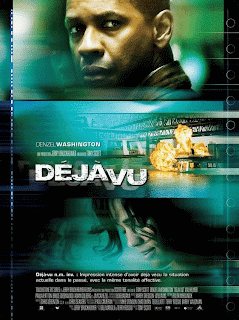
The film, Déjà Vu starring Denzel Washington, is an exceptional film to demonstrate the concept of the televisual described by Lisa Parks in her essay titled “Satellite Panoramas”. Parks explains the integration of technology as an epistemological system. She uses the satellite images captured by the Hubble telescope to exemplify her argument of technological observation. “Televisual epistemologies are the specific knowledges and knowledge practices that form around technological acts of distant observation.” The observation of outer space brings about different interpretations and meanings that can be constructed from such observation. The parallel between the Hubble telescope and the mechanism device to control the past in Déjà Vu is the topic of discussion in my essay and its use of technology as a means of epistemological systems.
In the film, Déjà Vu, Washington is playing a detective to solve a murder case and embarks on a journey to locate a secular group that operates a technological device that displays moving images of the past. They are watching the victim in her final days of living through satellite imagery on a large screen as an attempt to solve the murder. The panoramic view of the past is what allows Washington to solve the case. This is the same type of observation Parks argues in her essay: “When Hubble images move beyond the ground station and into the mediascape, they become satellite panoramas. These panoramas are not tranquil vistas of outer space; rather, they are contested discursive terrains that are activated as the conventions of astronomical observation, digital imaging, broadcasting, and filmmaking are combined and brought to bear in their production, circulation, and interpretation.”
Another aspect relating to Parks essay is the remote control. In Déjà Vu, Washington discovers that the panoramic view of the past is not just an observational mechanism, but an active engagement that can be communicative to the subject within the image. He is able to send signals of warning to the victim prior to her death in an attempt to save her life. The technological mechanism is a live broadcast of the past which can be manipulated to enable a different future. “Embedded within Hubble’s capacity for distant vision is a discursive strategy of remote control.” It can be said that the possibilities of outer space as well as the operation of the past are infinite, making us wonder how we would like to construct it.
The visual aspect as well as the discursive strategy of remote control is what make the film, Déjà Vu, relevant to Parks’ essay. The film demonstrates that our use of technology as an objective observational device cannot be used as such due to the manipulative discourses that are allowed through the televisual. The significance of the televisual in the film comes from its use of technology as a mode of observation to engage in epistemological systems. The device in Déjà Vu and the Hubble telescope are modes of observation, which are presented as objective televisual technologies, but rather are visual displays of images left up to subjective interpretations which are malleable.
No comments:
Post a Comment